
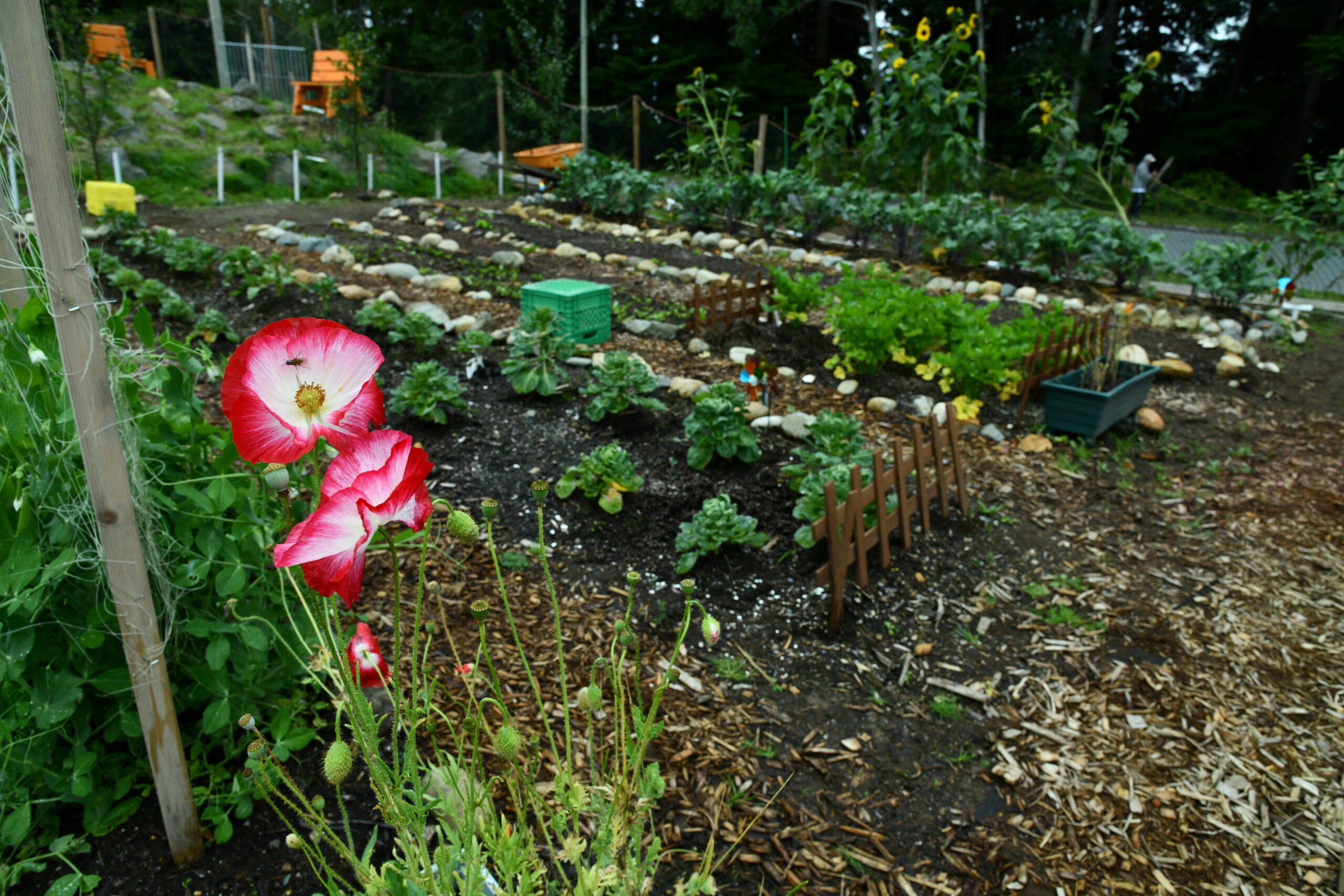
The Nawalakw Garden Photo: Cheyenne Bergenhenegouwen, REFBC
The Soil of Our Garden: The Nawalakw Garden and the Journey to Nourish a Community
By Cheyenne Bergenhenegouwen
“When I speak with people, or I share what I am doing in the garden, I am happy, and I feel I have a luminescence outside of myself when I share it with my people. When they approach me and talk to me, it’s like their body is right here, but their excitement is outside of themselves.”
Edwina Rufus, Food Security Coordinator, Nawalakw
Edwina Rufus sits on a giant rock, unearthed during the construction of the Nawalakw community garden. A cluster of towering sunflowers, two large greenhouses filled with peppers and tomatoes, and perfectly straight rows of in-ground garden beds – encircled by rocks of different shapes and sizes including a few that are heart shaped – can be seen behind her. On the 2.5 acres of land there also grows 60 raspberry bushes, 100 blueberry shrubs, 12 plum trees, 25 apple trees, and many strawberry and rhubarb plants.
The garden is part of the Nawalakw food security and food sovereignty program. Nawalakw is a social venture to create presence, protection, and environmental stewardship in the traditional territories of the Kwakwa̱ka̱ʼwakw peoples while reinvigorating the Kwakwa̱ka̱’wakw language and culture. The food security and food sovereignty program aims to empower Kwakwa̱ka̱’wakw communities to have access to, and control over, healthy foods based on their cultural values.
“It’s dirt out in the yard, but it’s soil in the garden,” Edwina smiles as she recites the familiar saying. “I’m quite sure it could be keeping me alive. Not just being a human being at home. I say get up and go, grow, create, water. It is a blessing to be here and I’m thankful for everybody that’s a part of this and everybody that’s here and we get to share.”
Edwina has born and raised in ʼNa̱mǥis territory in the small community of Alert Bay on Cormorant Island, a small island off the eastern shores of northern Vancouver Island.
As an adult, Edwina previously came and went from her community in pursuit of schooling, her career, and other ventures, but now she is working to stay rooted in her community. “I thought, it is time to get connected to myself and try not to carry anything else. So here I am, in the garden, and I’m thrilled and happy to be here.”
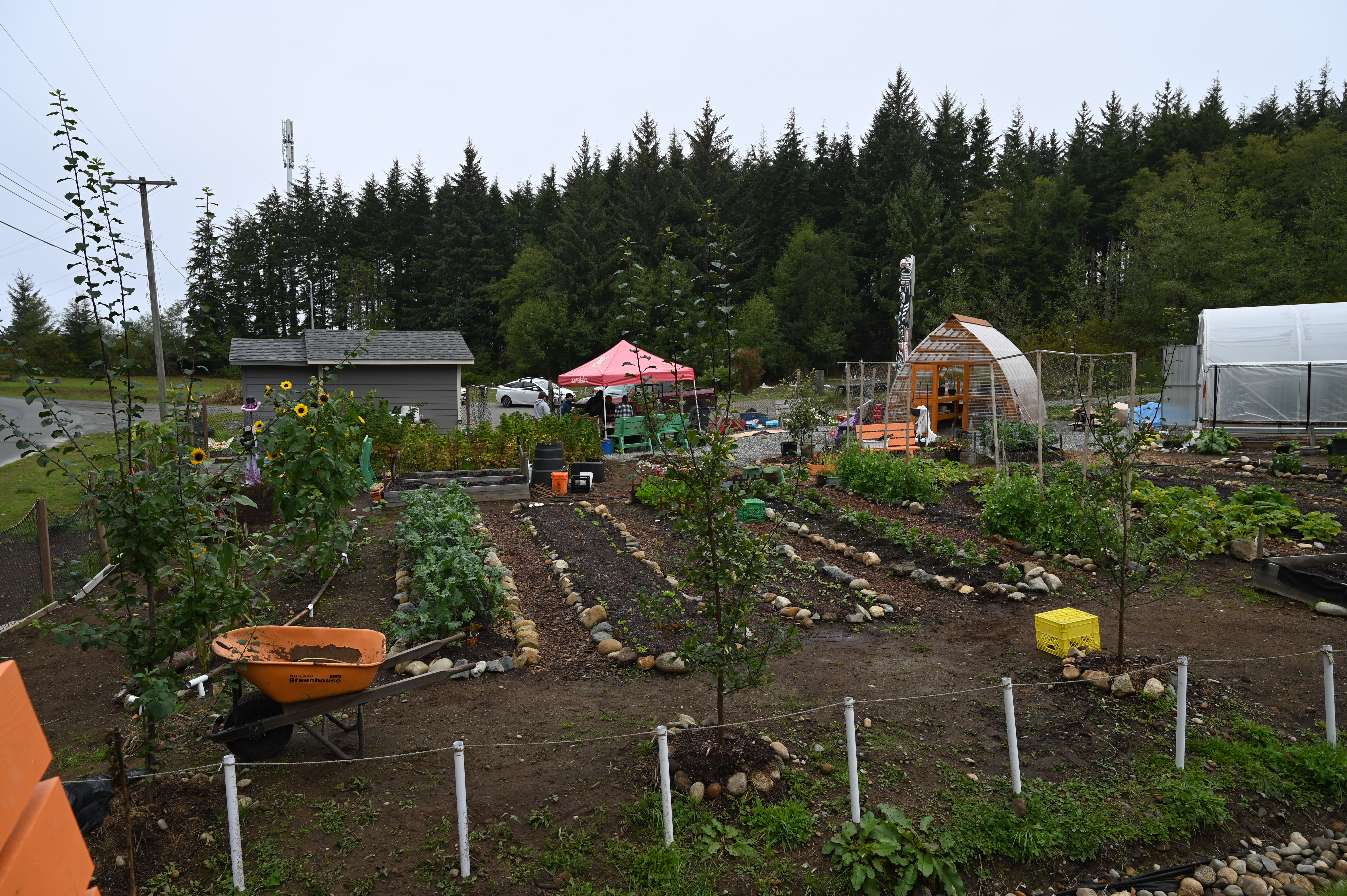
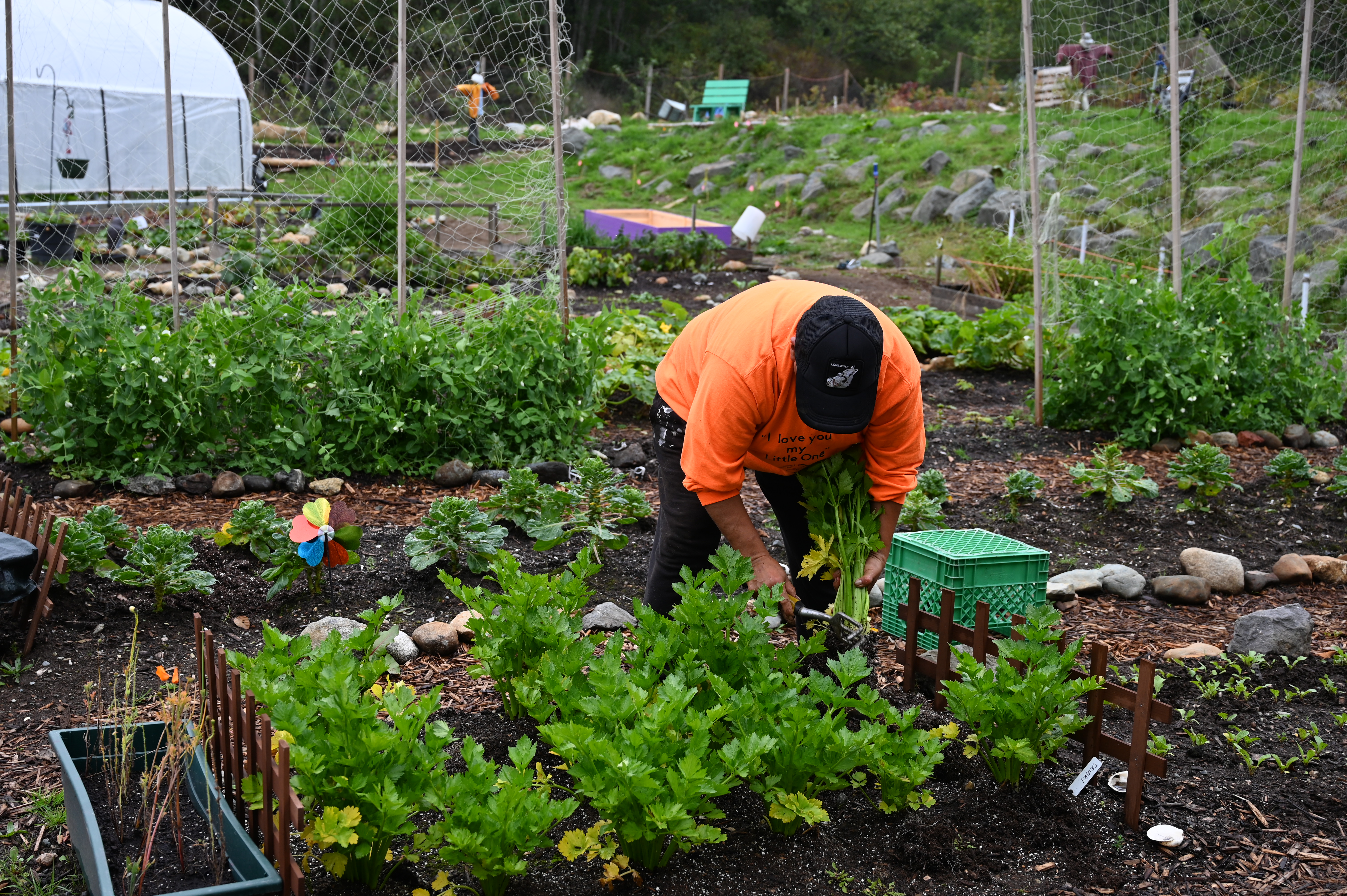
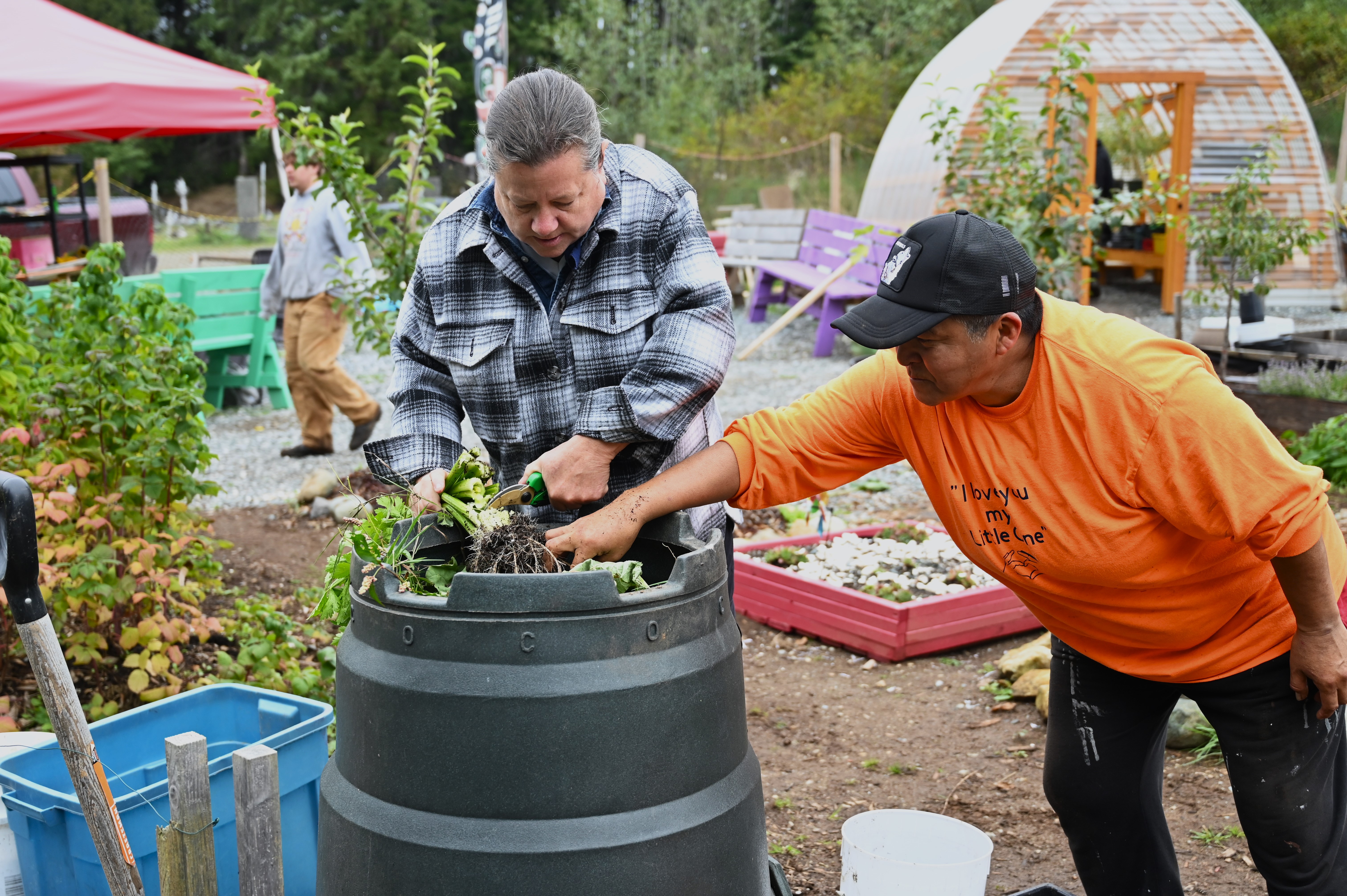
Edwina Rufus harvesting produce from the garden with Mara Jernigan, chef and hospitality consultant. Photos: Cheyenne Bergenhenegouwen, REFBC
Edwina shares that working in the garden has been a healing experience for her. “I know working with soil or in the garden is a healthy, positive thing for myself. Anxiety and depression were a part of my days in the past, but being here is pretty awesome because we’re always doing something. I’d be sitting here just weeding, you know. It’s always going to grow, and grow, and grow. Just like myself, I guess. Keep growing and learning.”
The Nawalakw food security and food sovereignty program began in the early days of COVID-19 when health regulations and social distancing put a halt to several transportation routes. Fresh produce became scarce and when it was available the cost was high, especially for those in the community on fixed incomes.
Devery Svanvick has worked with the food security and food sovereignty program for four years. Devery is from ʼNa̱mǥis, Mama̱liliḵa̱la, and the Tsimshian tribes.
“We started off with garden boxes. We started with 20 garden boxes, and we put them in the Elder’s yards and people who wanted to try gardening,” said Devery. “And then we kind of went up to 50, and then 100 garden boxes. We started planning the farm because we wanted to provide more food for the entire community.”
Four years ago, the garden was nothing more than a plot of land, across from the community cemetery, overgrown with alders and bushes.
“It was just trees. It was covered in trees,” said Devery.
Nawalakw contracted Hannah Roessler, an agroecologist and ethnoecologist, to support the creation of the community garden.
“It was during COVID and we started by meeting online and I would look at the garden site over Google Maps and Google Earth first. I’m absolutely blown away by what has been accomplished by Verna and her team. I’ve not seen anything like it,” said Hannah. “Transforming a piece of land, raw land, that was covered in alder and turning it into an abundant site has been so deeply inspirational for me. I think it has to do with the heart and the soul in the community that really values this project.”
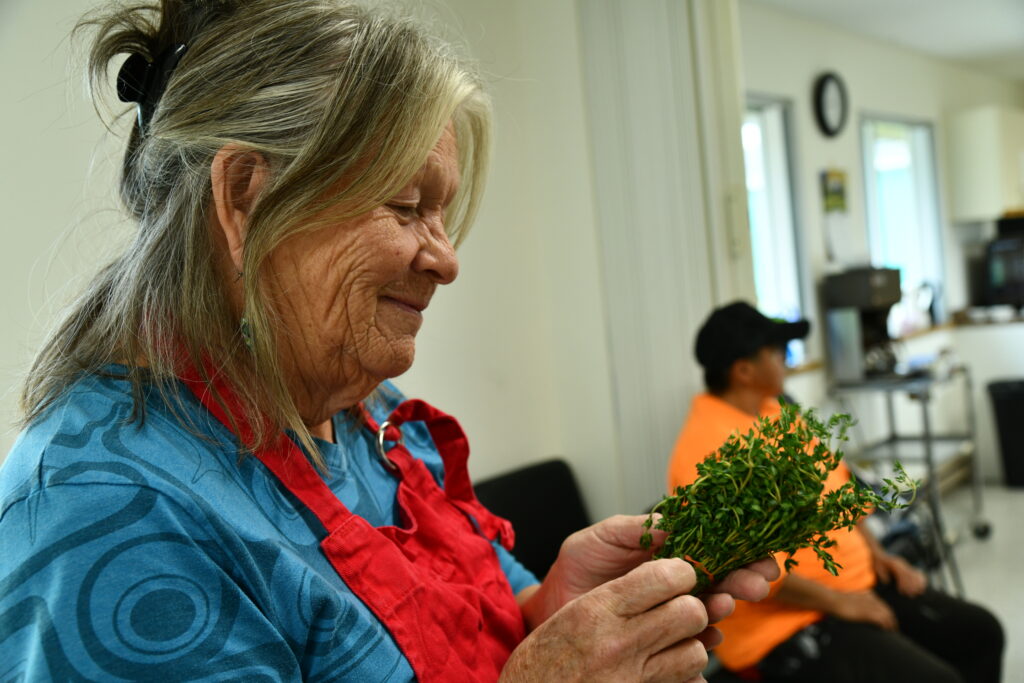
Verna Ambers holding thyme at the Elder Centre. Photos: Cheyenne Bergenhenegouwen, REFBC
Verna Ambers joined Nawalakw as the Food Security Manager in 2021 and has since been a ray of sunshine that has helped the garden and the youth working in the garden thrive and grow.
“Nugwa’a̱m Ga̱na, that’s my name that they call me in Kwak̓wala,” said Verna. “This is my second year here. I’m helping to shape the garden and work with the students that come into the garden and to have them express more of an interest in growing food for the community, their grandparents, and families.”
Verna buzzes around the garden like the bees and butterflies, smelling the herbs, touching the flowers, and sinking her fingers into the soil. Verna came out of retirement to be a part of the work because she saw the value it had for the community and for the youth.
“I read somewhere that the average age of a gardener is 48 years old, so we have no young people coming into this type of job,” said Verna. “I think it’s a really good place for young people to come into because you get your hands in the soil. You get dirty. You get an opportunity to talk one-on-one with individuals and share sometimes really intimate things if you trust the person you are with in the garden.”
The garden is a classroom where Verna teaches more than just how to grow fruits and vegetables.
“I teach the youth what grows in the earth and that we need to treat the earth good, wherever we go. We got to leave this place better than when we got here. We talk about all kinds of ways that we could help,” said Verna.
Nic Conway is one of the summer workers and has worked in the garden two summers in a row. “It is really rewarding seeing all this stuff you plant one day and then you come back the next week and it’s growing.”
For Nic, the experience opened his eyes. “I’ve learned a lot and I know there’s more out in the world for me to do.”
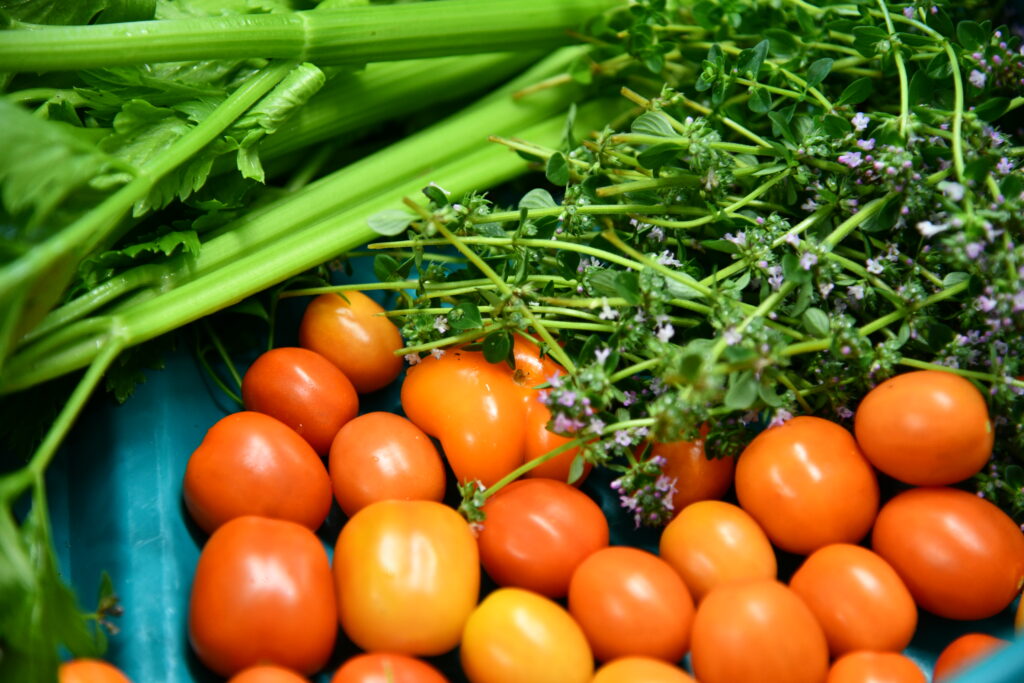
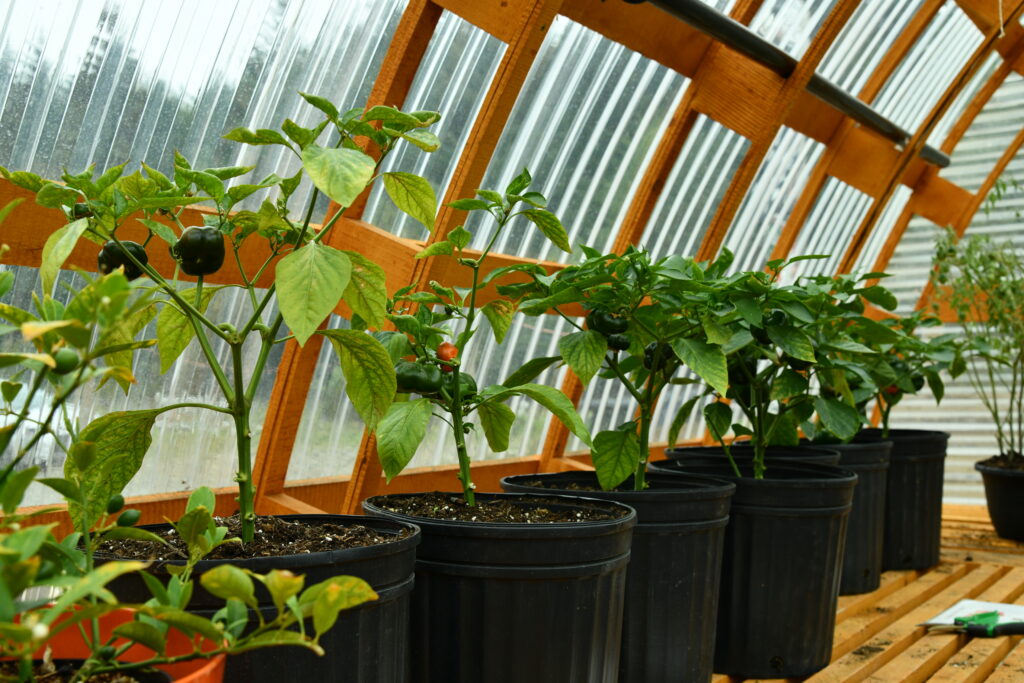
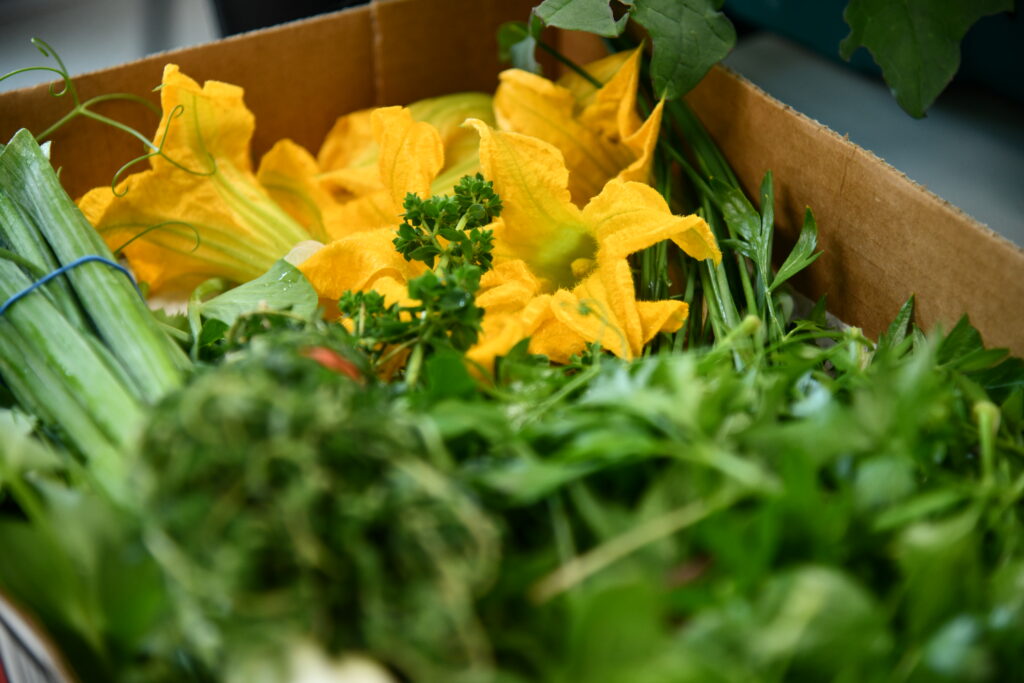
Produce from the Nawalakw garden. Photos: Cheyenne Bergenhenegouwen, REFBC
When the plants in the garden are bursting with fruit and the vegetables have ripened, the garden team begins harvesting the produce to give away to the community. The team cleans, bundles, and places the food into perfectly packed food boxes. Community members will line up an hour before the giveaway starts and soon all the boxes will be gone and will help to feed families from different homes.
“They’re so happy,” said Verna. She recalls one story that has stuck with her on the value of sharing and feeding one’s community.
“A man was raising his grandchildren and great grandchildren, and they wanted tomatoes from the store. He couldn’t get tomatoes because they were too expensive. And I remembered that when we grew our tomatoes last year. We put lettuce, tomatoes, and a green onion in a box and I knocked on his door. I said, this is from our garden, and he was just so happy. It’s little things you remember, like that, to make somebody’s day just a little bit brighter.”
Verna has many stories of ways the garden has supported different people in the community. There was a young boy she taught how to use a shovel to dig a hole for one of the plum trees. Once he learned, all he wanted to do was use the shovel and dig the holes. Verna’s grandson also spent time working in the garden. He has since decided to go to university and get a degree in horticulture.
Chabanee Matilpi, another summer worker, expressed how proud he was of building all the garden boxes. “All the little beds I made for the flowers and stuff. All the colorful painted boxes I made. That purple one. That orange one. That one right there. That one over there,” he points each one out, a smile on his face.
Verna said that out in the garden “you learn skills, you learn patience – things don’t grow quick, it takes time. You’re building up self-esteem, confidence, and getting them to have a good feeling of what it’s like to care for and feed your community.”
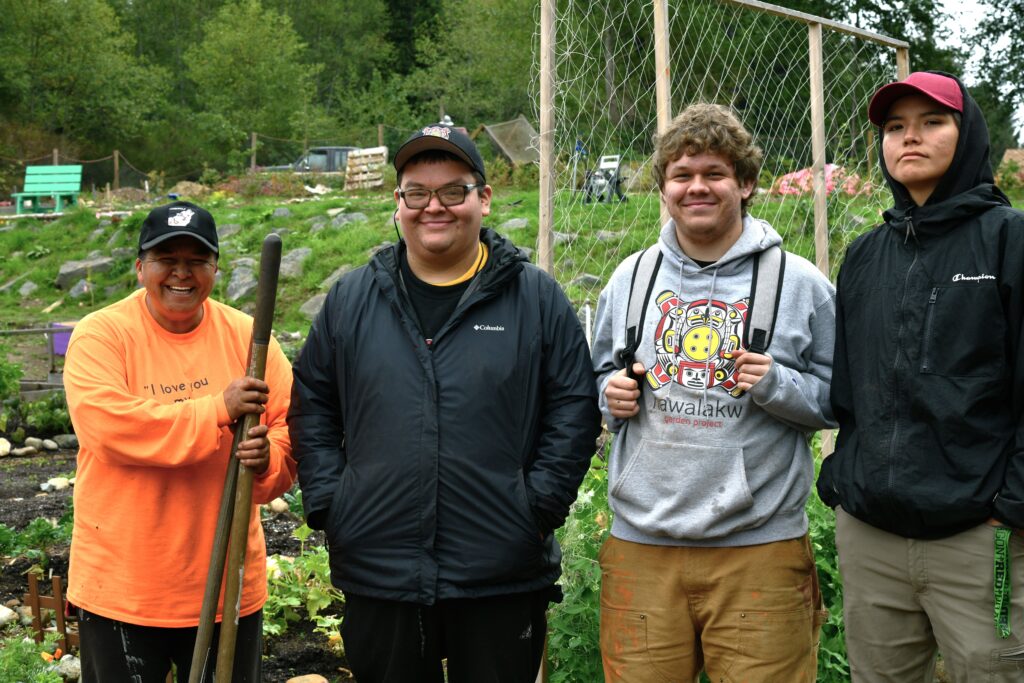
From left to right: Edwina Rufus, Chabanee Matilpi, Nic Conway, and Devery Svanvick at the Nawalakw Garden. Photos: Cheyenne Bergenhenegouwen, REFBC
One of Edwina’s happiest moments in the garden was seeing a carrot she had grown from seed. “I only knew about going to the store to get food. When I first looked at a carrot … I just about cried when I saw it. I’ve never grown a carrot before. This whole place is awesome, and I think it has really helped me.”
There have been a lot of changes and a lot of growth through this program and at the center of it all is love and care. The love and care for one’s community. The love and care for the earth and the soil. The love and care for the foods that keep us nourished and healthy.
“I think if my mum was alive, I think she’d totally love it up here,” said Edwina as she takes in the garden that surrounds her, grown from the soil her and the team have enriched out of the love for their community.
Watch the video on the Nawalakw garden project.
The Nawalakw vision is to create a social venture that is a catalyst for healing, language, and cultural connection, and sustainable Indigenous enterprise. Their Summer Internship Program is supported by REFBC’s Indigenous Grants Stream. You can learn more about Nawalakw and their work at www.nawalakw.com.
SHARE